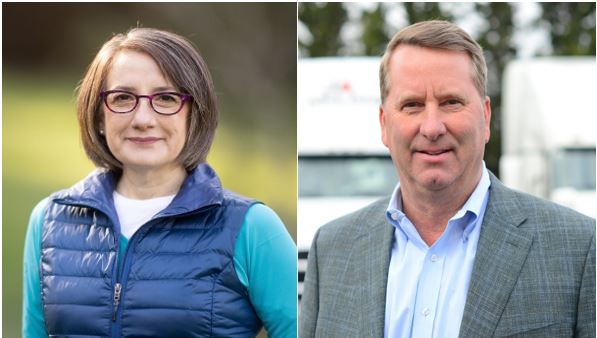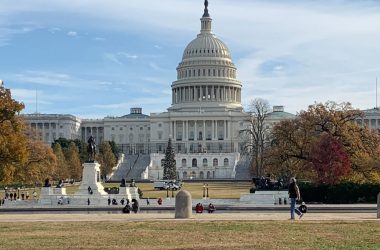OREGON CITY — A Clackamas County judge ruled Thursday that Republican Mike Erickson’s lawsuit against Democratic congresswoman-elect Andrea Salinas can continue, and Erickson’s attorney said Erickson isn’t currently seeking to bar Salinas from taking office in January.
That could change, Erickson attorney Jill Gibson told Clackamas County Circuit Court Judge Todd L. Van Rysselberghe on Thursday afternoon. Van Rysselberghe was under the impression that Erickson, who sued under an Oregon law allowing for an election to be overturned if the victor told a lie that changed the course of the election, wanted to keep Salinas from being sworn into Congress.
Gibson interrupted Van Rysselberghe as he read a ruling on a motion by Salinas’s attorneys to strike the case to say Erickson wasn’t seeking to keep Salinas from office. She later clarified that Erickson, a logistics consultant from Lake Oswego, is still deciding whether he wants to overturn the election or if he is merely seeking hundreds of thousands of dollars in damages from the Salinas campaign for factual errors in a negative campaign ad about Erickson’s 2016 arrest for driving under the influence.
In rejecting an attempt by Salinas’s attorneys to dismiss the case, Van Rysselberghe ruled that Erickson met a preliminary burden of proving that Salinas made a false statement by running an ad saying he was charged with drug possession and that she acted with knowledge or a reckless disregard for the truth by continuing to run the ad after Erickson’s attorney and a prosecutor told her team it was false.
“The Salinas campaign declined to change course upon receiving that information and continued running the advertisement,” Van Rysselberghe said.
Salinas defeated Erickson by just more than 7,000 votes out of nearly 294,000 ballots cast in the race. Erickson hasn’t conceded, unlike Democrat Jamie McLeod-Skinner, who lost a similarly close race in Oregon’s 5th Congressional District, or Republican Alek Skarlatos, who lost by a wider margin in the 4th District.
Erickson’s last public statement about the race was on Nov. 11, three days after Election Day. It took another three days for the Associated Press to call the race for Salinas because of how close it was and how many ballots had not been counted on Nov. 8.
“Though this race is still too close to call, I want to express my appreciation for each and every Oregonian who has supported my campaign,” Erickson said on Nov. 11. “We knew this race would be close, and the fact that we’re still neck-and-neck with over 75% of the vote counted is a testament to our hard work.”
His legal argument for overturning the election rests on the assumption that he would have won if campaign ads didn’t persuade some voters that he was a criminal and drug abuser. He also sought at least $800,000 in damages to reimburse him for ads he said he had to run correcting the record, as well as attorney fees.
Erickson sought to paint Salinas as weak on crime, and Salinas responded with an ad describing his 2016 arrest for driving under the influence. He had a .12% blood alcohol content – well above the legal limit of .08%. The ad described it as “nearly twice the legal limit.”
Erickson pleaded guilty and had his DUI charges dismissed after completing a one-year diversion program that included having an ignition interlock device installed on his car, abstaining from visiting bars or consuming alcohol, marijuana or other controlled substances and attending a panel where victims of intoxicated drivers talked about the impact on their lives.
The Salinas ad also said Erickson was “charged with felony drug possession” and featured an image of four lines of an unidentified white powder. Officers found a single 5 mg Oxycodone pill in his wallet while booking him into jail and recommended drug charges.
Erickson’s attorneys said that substance was clearly intended to look like cocaine, and Van Rysselberghe agreed.
“I think most people would initially consider that to have some reference to cocaine,” he said. “It may be possible to crush a pill, but that’s certainly not the optimal way to take that kind of medication.”
The guilty plea included an agreement that prosecutors from Hood River County wouldn’t pursue drug charges for the Oxycodone. Erickson maintains that he was holding the pill for his wife, who had a prescription because of a recent surgery and didn’t want to carry a purse to the wedding they attended.
A handwritten petition for a plea agreement signed by Erickson and included in court records twice said the district attorney would dismiss “felony possession” charges. Erickson’s 2016 defense attorney, Tara Lawrence, previously told the Capital Chronicle that she made a “mistake” in preparing it and that felony charges, which would apply only to a larger amount of drugs, were never on the table.
After the Salinas ad began airing, Hood River County District Attorney Carrie Rasmussen provided the Erickson campaign with a copy of her office’s plea deal offer, which was not included in publicly available court documents. That plea offer said prosecutors would “dismiss remaining violations and not file additional charges, including but not limited to recklessly endangering another person and unlawful possession of hydrocodone.”
Prosecutors never filed drug charges, but Salinas and her lawyers maintain that ad was accurate and that police could charge him. They’ve cited other documents, including a release agreement from the Northern Oregon Regional Correctional Facilities that lists unauthorized possession of a controlled substance and driving under the influence as charges.
Salinas attorney Abha Khanna, with the national Democratic election law firm Elias Law Group, also cited a September statement Erickson gave to the Oregon Capital Chronicle in which he said a judge dropped drug charges.
“There’s a common understanding that police have the ability to bring charges,” Khanna said.
Khanna argued that Van Rysselberghe should rule in Salinas’ favor because a reasonable person could infer that the statements were true. She and Salinas attorney Harry Wilson of Portland-based Markowitz Herbold will have another chance to make their case during a four-day trial scheduled for the week before Christmas.
That trial could be postponed if Erickson confirms that he won’t seek to overturn the election, as it was expedited to ensure a decision would be issued before Congress convenes on Jan. 3, 2023. Wilson said he and Khanna intend to appeal Van Rysselberghe’s ruling on their motion to the Oregon Court of Appeals, which could also delay a final decision.
Oregon Capital Chronicle is part of States Newsroom, a network of news bureaus supported by grants and a coalition of donors as a 501c(3) public charity. Oregon Capital Chronicle maintains editorial independence. Contact Editor Lynne Terry for questions: [email protected]. Follow Oregon Capital Chronicle on Facebook and Twitter.
STORY TIP OR IDEA? Send an email to Salem Reporter’s news team: [email protected].

Julia Shumway is deputy editor of Oregon Capital Chronicle and has reported on government and politics in Iowa and Nebraska, spent time at the Bend Bulletin and most recently was a legislative reporter for the Arizona Capitol Times in Phoenix. An award-winning journalist, Julia most recently reported on the tangled efforts to audit the presidential results in Arizona.










